Deleted
Deleted Member
@Deleted
Posts: 0
Likes:
|
Post by Deleted on May 5, 2018 23:33:48 GMT
the Phantom Menace. It's a good movie.
|
|
|
|
Post by kijii on May 6, 2018 1:54:26 GMT
TBH, I actually liked The Life and Times of Judge Roy Bean. Sure, it was more than a little of an over the top re-telling of an Old West story, and many bits of dialogue in the film almost seemed like they were written by an absurdist comic. But all in all it was good raucous fun. I liked the appearance, early in the film, of Anthony Perkins as a roving reverend. He only had a fairly brief scene, but it contained some good lines nevertheless:
Rev. Mr. LaSalle: [Narrating] The first time I saw Roy Bean, he was set on killing me. Thought I was the Devil, come to take him. It was an understandable thought, considering all the carnage that he had so recently brought forth.
Rev. Mr. LaSalle: That was the first and last time I saw Judge Roy Bean. I never got back to that country and died of dysentery in old Mexico. I haven't seen him since, so he probably went to Hell.
----------------------------------------------------------------------------
I agree that from first to last, this is the story about the legend of Roy Bean rather than the simple, easily manipulated story of Roy Bean such as that told in William Wyler's. The Westerner (1940). I think John Huston probably said, "Hell, if we want to turn him into a tall tale (ala, Pecos Bill, Paul Bunyon, John Henry) why not just go all the way and set him in a total tall tale." And Huston, just exercised his guilty pleasure here.
But, still as someone who had to sit through it--to fill in some John Huston missing movies--it was a grind for me. |
|
shield
Sophomore
  Reading is to the mind what excercise is to the body
Reading is to the mind what excercise is to the body
@shield
Posts: 776
Likes: 218
 
|
Post by shield on May 6, 2018 18:04:19 GMT
Mr. Deeds Goes to Town (1936) - 82 years after it´s release I had the pleasure of viewing this film. Glad I did.  |
|
|
|
Post by neurosturgeon on May 6, 2018 19:00:46 GMT
On FilmStruck, THE PASSIONATE FRIENDS (1949) with Trevor Howard, Ann Todd and Claude Rains. Directed by David Lean with music by Richard Addinsell. Highly recommended for those who enjoy romance.
|
|
|
|
Post by ZolotoyRetriever on May 6, 2018 20:53:58 GMT
I Knew Her Well (1965), Italian comedy-drama film directed by Antonio Pietrangeli, starring Stefania Sandrelli. DVR'd off of TCM a while back.
Nice little time capsule film depicting the rise and fall (literally?) of a provincial Italian girl who goes to Rome and becomes a starlet and a celebrity. Throughout most of the film, the dialogue is a bit fast-paced, and if you don't speak Italian, you may have trouble keeping up with the subtitles, but then again, you get the feeling that the girl is so ditzy, and the plot is simple enough, that you can infer what's going on even without reading every single word of the subtitles. Of course, if you're a purist, you can freeze-frame at each subtitle, if need be.
All in all I found this to be a very good film. It's beautifully filmed in Black & White, which is a bit incongruous since one major theme of the picture is the hipness and fashion sense of the starlet and the people she hangs with - I guess it's all meant to demonstrate the Roman equivalent of "Mod London" which was then happening over in England. It's listed as a comedy-drama, which is about right: there are roughly equal parts of ditzy fun stuff coupled with more sober reflections on life's realities, but the director blends them nicely and it gives the film tremendous balance. It has a very enjoyable soundtrack, too: lots of then-current Euro-pop songs are woven into the fabric of the plot, and some of them were big enough hits that some of you may still recognize them today.
BTW, if you want to see a good copy of this film, the title is available through the Criterion collection. www.criterion.com/films/28600-i-knew-her-well
_medium.jpg)
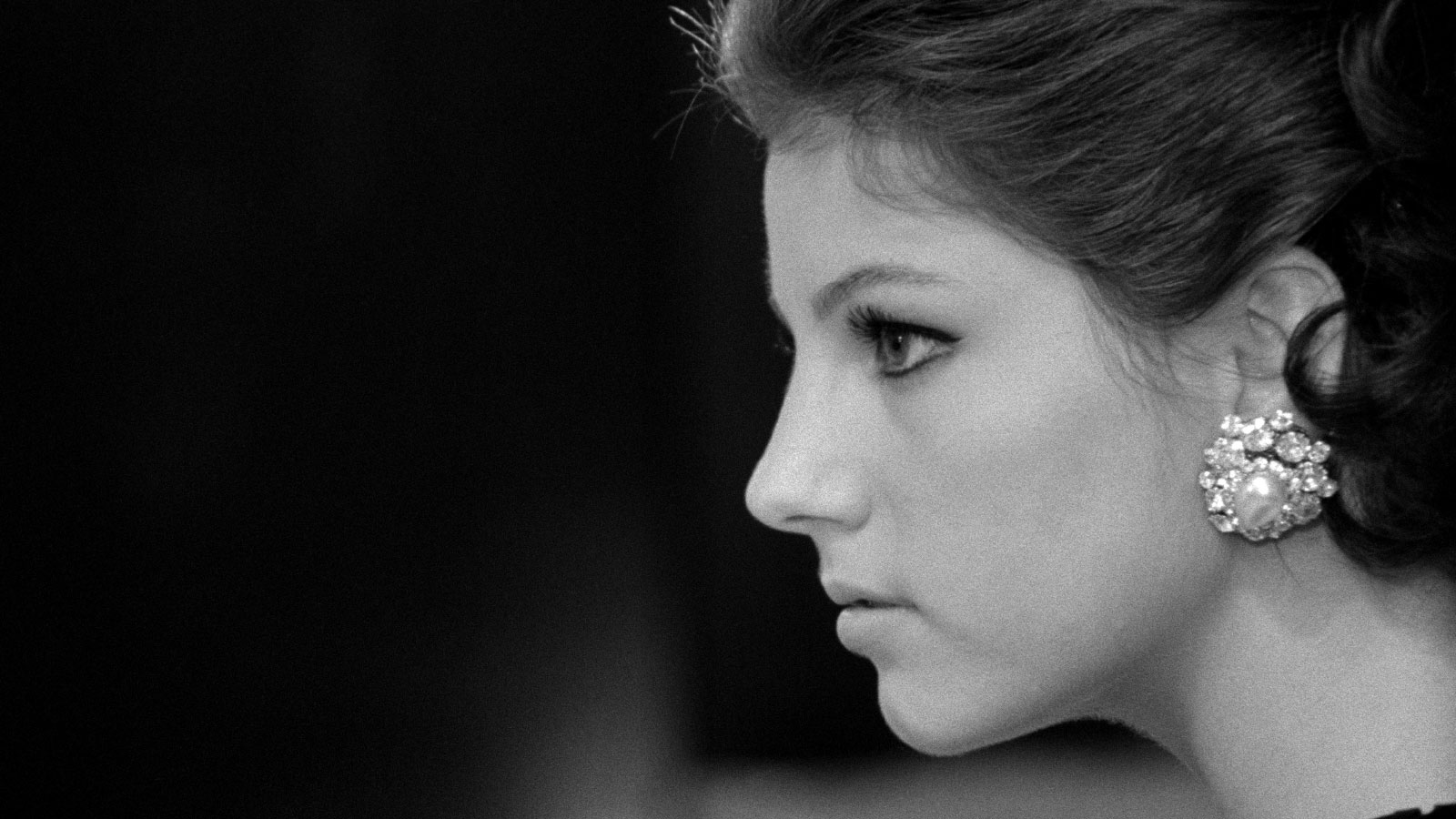
|
|
Deleted
Deleted Member
@Deleted
Posts: 0
Likes:
|
Post by Deleted on May 6, 2018 21:44:48 GMT
Attack of the clones: let me tell you it has a compelling romance in it. Not that I like that sort of thing, however if I did. I'd probably enjoy it even more.
Actally I only caught the first one third of it just yesterday, so far I like it even more than the previous movie, the phantom menace!
|
|
|
|
Post by kijii on May 7, 2018 6:18:02 GMT
Valmont (1989) / Milos Forman
In addition to directing One Flew Over the Cuckoo's Nest (1975), The People vs. Larry Flynt (1996), Man on the Moon (1999), and the musical, Hair (1979); the late Milos Forman directed several great period pieces. These movies included, Ragtime (1981), Amadeus (1984), and my latest wonderful discovery, Goya's Ghosts (2006)--reviewed earlier in this thread.
With Valmont (1989), based on Choderlos de Laclos' novel, Les liaisons dangereuses, he presented a more playful and less sadistic movie than the Christopher Hampton play used by Stephen Frears' Dangerous Liaisons (1988)=DL. In fact, from novel to screen the Stephen Frears and Milos Forman versions of the same novel took a totally different paths. The Frears' movie went from the Christopher Hampton play to screenplay. The Forman movie went from novel to screenplay by Jean-Claude Carrière and Milos Forman.
This movie seems much more fun than the narcissistic and sadistic DL. Here, Marquise de Merteuil is Annette Bening [Glenn Close in DL] ; Vicomte de Valmont is Colin Firth [John Malkovich in DL]. The two make a wager involving the deflowering of Cécile de Volanges's (Fairuza Balk)[Uma Thurman in DL] virginity before her arranged marriage to an older count, Gercourt (Jeffry Jones). When you add Madame de Tourvel (Meg Tilly) [Michelle Pfeiffer in DL] to the vast late 18th Century French estate, the story only takes on more possibilities. Oh, by the way, Cecile is in love with her harp instructor, Danceny (Henry Thomas) who has been writing love poems to her. In DL, Dancey is played by Keanu Reeves.
For me, Valmont is a masterpiece in writing, casting, acting and directing. Often plot points are only suggested rather than spoken. However, where all is said and done, Colin Firth and especially Annette Benin are the puppeteers in this tale about the difference between having a spouse and having a lover....because one needs one of each in the world of this story: Madame de Tourvel has a spouse but no lover--yet. The youthful Cécile and Dancey have not yet discovered the need for having both a spouses and a lover. Valmont and Merteuil know all the tricks of being lovers and want nothing to do with being spouses.
For the best synopsis of the movie with SPOILERS, see: en.wikipedia.org/wiki/Valmont_(film)
.

Marquise de Merteuil (Annette Bening) and Vicomte de Valmont (Colin Firth) Mertuil: You're the only one who can help me. Valmont: You want me to challenge him to a duel? Mertuil: [chuckles] Visconte, for I what I have in mind I need you very much alive. 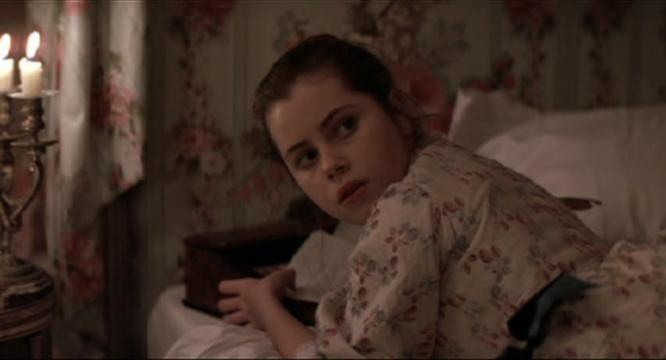

Cécile de Volanges (Fairuza Balk) 
Madame de Tourvel (Meg Tilly) 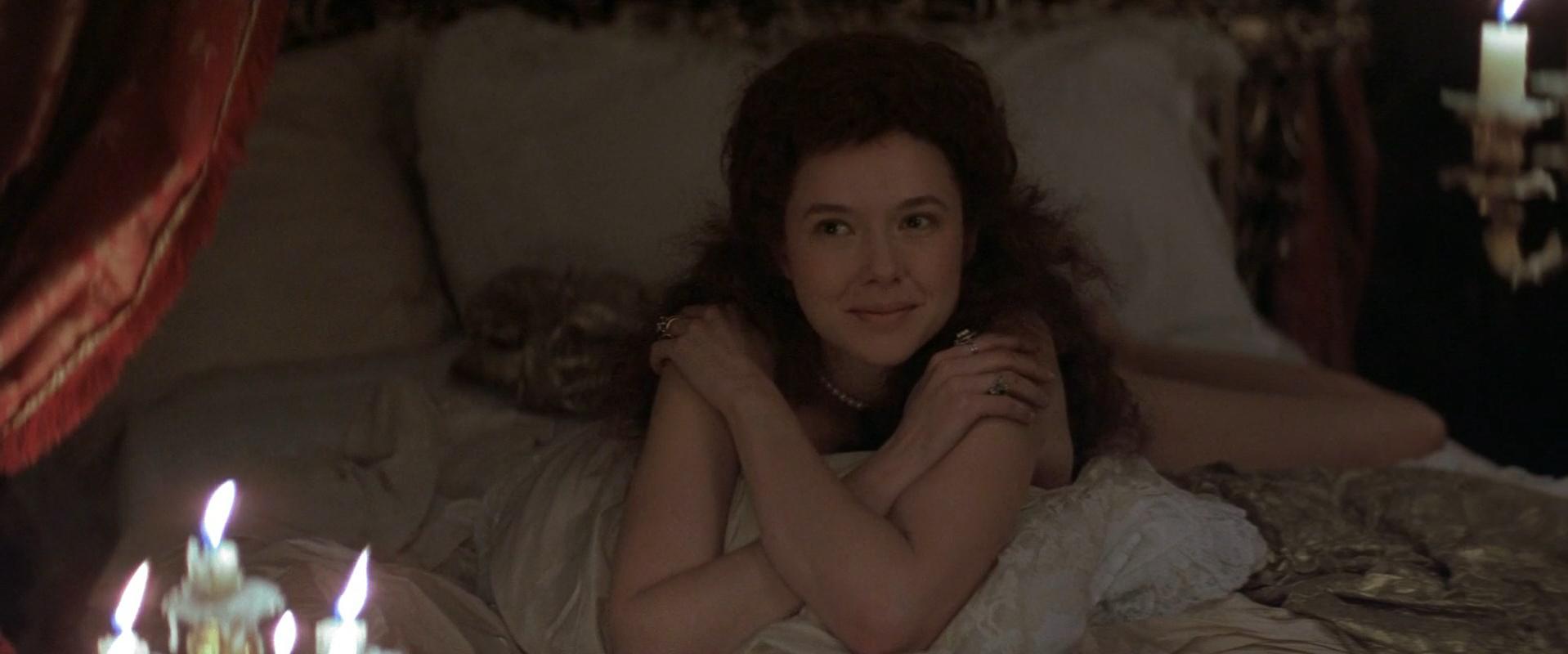
|
|
|
|
Post by teleadm on May 8, 2018 17:20:51 GMT
Where the Boys Are 1960, directed by Henry Levin, based on a novel by Glendon Swarthout, starring Dolores Hart, Connie Francis, George Hamilton, Yvette Mimieux, Jim Hutton, Barbara Nichols, Paula Prentiss, Frank Gorshin, Chill Wills and others. Comedy-Drama-Romance about four very different college girls who drives drive to Fort Lauderdale, Florida for spring break and seek out various adventures and romances for themselves. A time capsule of an era that might never have been. For those thinking that this would be a Frankie And Annette kind of beach movie might be very disappointed, even thought it has been called the first beach movie. This was also a way for MGM to show off their new young stars in a suitable movie, though Francis never had any wish to act in any movie. There are a few surprices here, when one of the girls asks a teacher about pre-matrimonial sex, something that seems very bold to even mention in an early 1960s movie from one of the big studios. Hart and Hamilton plays the mature sensitve couple, Hutton and Prentiss is the comical couple, Francis and Gorshin is the quirky musical couple, Mimieux hunts Ivy Leaguers but get's an experience that she might never be able to forget because she (though it's never mentioned by word) is raped. One could say that Mimieux's story is also a moral warning that some men thinks with other things than their brains. It's worth a watch, depending how much one like the young stars, it's neither bad or good and a bit interesting to see, and for those who has been to Ft. Lauderdale, there is a lot of location shots. 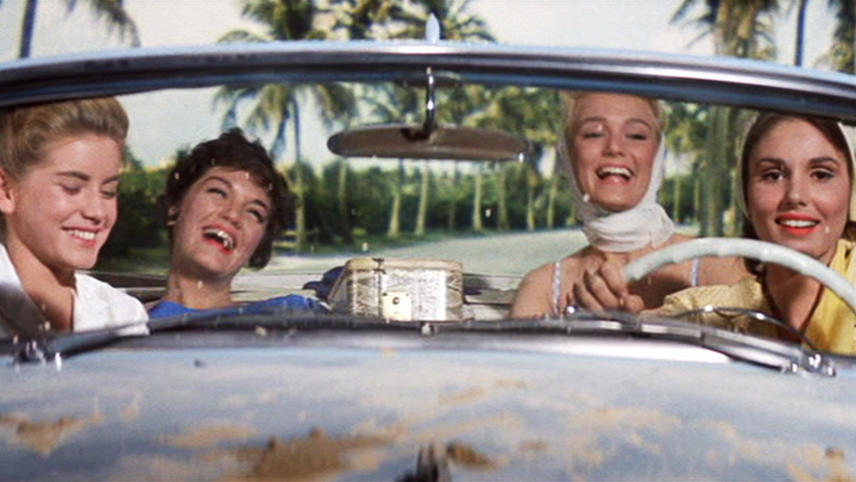  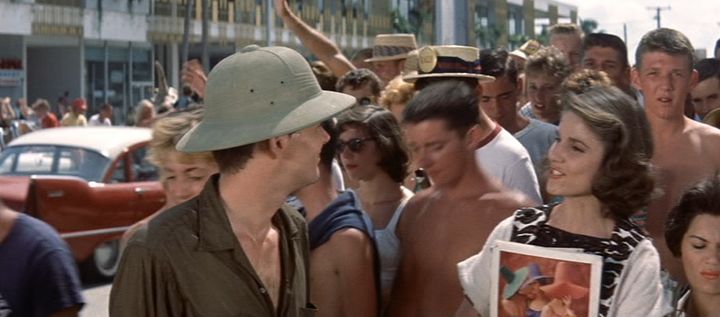
|
|
|
|
Post by kijii on May 9, 2018 0:15:28 GMT
Chase a Crooked Shadow (1958) / Michael Anderson
This is a good crime thriller which will leave you guessing what is going on 'til the end. Most of the movie has Richard Todd coldly sparring off with Anne Baxter, an heiress to a South African diamond magnate. Todd claims to be her brother while she claims he is not. Yet.....well wait til the end.....
This movie was produced by Douglas Fairbanks Jr. and he appeared on an epilogue at the end of the movie to please not tell anyone how this movie ends..I was right, because we do wonder what is happening until the final scenes.
Link here for full synopsis WITH SPOILERS: www.tcm.com/tcmdb/title/70697/Chase-a-Crooked-Shadow/full-synopsis.html
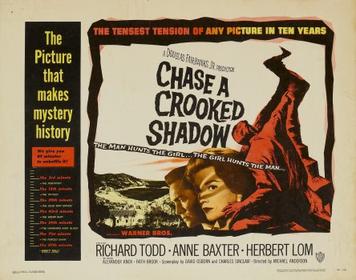 

|
|
|
|
Post by teleadm on May 9, 2018 17:28:12 GMT
Gentlemen Prefer Blondes 1953, directed by Howard Hawks, based on a musical comedy by Anita Loos and Joesph Fields, starring Marilyn Monroe, Jane Russell, Charles Coburn, Elliott Reid, Tommy Noonan, George Winslow, Marcel Dalio and others, songs by Jules Styne and Leo Robin, plus two songs by Hoagy Carmichael and Harold Adamson. Musical Comedy about showgirls Lorelei Lee (Monroe) and Dorothy Shaw (Russell) who travels to Paris by Île-de-France, pursued by a private detective (Reid) hired by the suspicious father of Lorelei's fiancé (Noonan), as well as a rich, enamored old man (Coburn) and many other doting admirers. The star power of Monroe and Russell made this a huge commercial success, expertly directed by Howard Hawks, who manages to give the song numbers a bit of MGM polish, that seldom happens in non-MGM movies, GPB is a 20th Century Fox production. The "Diamonds Are a Girls Best Friend" number is iconic, and the other melodies are easy to remember. Musicals usually moves around in parallel universes that slightly reminds of our own reality, and that's OK, and explains how enormously spacious it is aboard Île-de-France. With all respect to those who love this movie, I'm sorry but I didn't find it especially interesting except for what I have mentioned above, and if it is satire, I simply don't get it. Something about Russell's make-up makes her look nearly green in her face in a few scenes.  
|
|
|
|
Post by kijii on May 10, 2018 22:20:24 GMT
Ivy (1947) / Sam Wood
This is a new movie for me, and I loved it!
If you read the user reviews on the IMDb, you will read about the many gowns Joan Fontaine wore in the movie. OK, so that's true. Now, let's just get on with the great movie she made while wearing those gowns.
I am so use to seeing Joan Fontaine in roles about shy scared women--Rebecca (1940), Suspicion (1941), The Constant Nymph (1943), and heralded Letter from an Unknown Woman (1948)--that is nice to see her in a more complex role.
Here, Fontaine plays woman who is not too nice. She is married to one man (Richard Ney), having an affair with another man (Patric Knowles), and trying to drop him so that she can have an affair with yet another (richer) man (Herbert Marshall). The story starts out in a somewhat formalistic way but, when her husband dies, the movie builds into an Edwardian film noir thriller. It's always nice to discover a great new movie that you haven't seen before and this one fills the bill for me. Oh, also pay attention to the two maids in the movie because their conflicting stories may serve as a clue towards solving the mystery of the movie. Their is a also a pretty good trial scene in this movie also.
For TCM Full Synposis with SPOILERS: www.tcm.com/tcmdb/title/79611/Ivy/full-synopsis.html
Ivy Lexton (Joan Fontaine) : [about Jervis (Richard Ney) ] I don't think I've been very fair to him you know.
Roger Gretorex (Patric Knowles): Fair? He's held you in his arms, people point you out as his wife. I think he's just about the luckiest man in England.
Ivy Lexton : Well that's sweet Roger, but we are rather forgetting that i'm married to him.
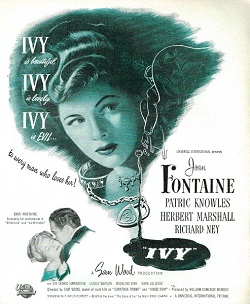 ![]()
 
|
|
|
|
Post by ZolotoyRetriever on May 10, 2018 22:45:42 GMT
Tokyo Chorus (1931), directed by Ozu, featuring Tokihiko Okada, Emiko Yagumo, Hideo Sugawara and a young Hideko Takamine. DVR'd off of TCM from one of their TCM Import nights where they feature something from foreign cinema (i.e., non-Hollywood).
Interesting, often-times poignant silent effort by Japanese director Yasujiro Ozu. It tells the story of a young father/husband in Tokyo who ends up getting fired from a job in the insurance business. Times are tough: our hero has a wife and 3 kids to fend for, the wife and kids aren't always 100% supportive or understanding, and prospects for decent employment during this time period are sketchy at best (several references are made to the global Depression that was going on at this time).
This is in black and white, with fairly sparse dialogue - or at least, there is comparatively little in the way of subtitles, but that's not a problem, as the visuals often times are more than enough to get the message across without too much verbalizing.
Anyway, it's an interesting movie, with some interesting glimpses of pre-WWII Japan (for that matter, it even predates Japan's entry into war in Manchuria). Look for a very young Hideko Takamine here as the daughter. She was a child actress who went on to become a very beautiful and popular Japanese actress.

|
|
|
|
Post by kijii on May 11, 2018 5:22:16 GMT
The Domino Principle (aka The Domino Killings) (1977) / Stanley Kramer
I may be alone, but I think that this is a modern interpretation of Kafka's The Trial; it is no coincidence that Kafka's name comes up twice in the movie. It is masterfully structured to demonstrate the absurdity of the rules of society when you have been molded to believe in what you have been taught. It stands, therefore, that outside of what you believe, there are no rules. You are just fighting to exist in a senseless world, blindly going from task to task and hoping to continue.
The movie was made after the senselessness of Vietnam had been proven; after Watergate; and after three major assassinations had occurred in our democracy. It was made at a time when the cold war was still being fought. The only thing that seemed to have saved us from total destruction was the threat of mutual nuclear annihilation. Spies and counterspies were a la mode within our culture.
So, why not have a movie about two inmates (Gene Hackman and Mickey Rooney) being removed from prison to work for a stateless organization to get their freedom? The only thing that was required of them was to not to ask any questions but just follow orders of the unknown leader of the organization. "Go here and wait! Go there and wait! You will be contacted when you are needed!"
"There is no sense asking us anything because we don't know anything either."
That was essentially what Richard Widmark, Eward Albert, and Eli Wallach had to tell the former prison inmates as well as Hackman's wife played by Candice Bergen.
No review of this movie would be complete without the movie's prologue. shown here: www.youtube.com/watch?v=hnKELQpVaDc


|
|
|
|
Post by teleadm on May 11, 2018 18:14:24 GMT
The Curse of Frankenstein 1957, directed by Terence Fisher, based on a novel by Mary Shelley with a Screenplay by Jimmy Sangster, starring Peter Cushing, Hazel Court, Robert Urquhart, Christopher Lee, and others. Refered to as the start of the Hammer horror era, I would actually call it a melodrama with horror elements done on a low budget, and it's also the first colour Frankenstein movie (Eastmancolor), it was also for a short while the most profitable movie worldwide made in Britain. A priest comes to a secluded prison to hear a confession from a man they think is nuts, and then the story reveals about a young man and his mentor and later partner trying to find the secrets of life. They succeed awake a dead puppy, but that is not enough, how about creating a perfect man? that's when the partner wan't to stop all experiments..but Victor does't listen. This movie has the dignity of beeing the first Frankenstaein movie made in colour, and for a little while was the most worldwide profitable movie ever made in Britain. The low budget is obvious, but frankly, it's a melodrama with a few horror scenes.   Not gonna show Christopher Lee's make-up as the Monster, that was actually a last minute thrown together thing, and had to be re-done every morning.
|
|
|
|
Post by ZolotoyRetriever on May 12, 2018 13:29:24 GMT
Skylark (1941), directed by Mark Sandrich, featuring Claudette Colbert, Ray Milland, Brian Aherne, Binnie Barnes, Walter Abel. DVR'd off of TCM telecast. Firt-time viewing.
Based on a play, this one is a talky rom-com whose story arc can pretty much be summed up thusly: happily married couple (Claudette Colbert, Ray Milland) suddenly become unhappily married; divorce ensues; happy divorce soon turns into unhappy divorce; reconciliation attempts are made by the now ex-husband until, finally, couple gets back together again and (we assume) become happily married again. That's pretty much it, with lots of snappy dialogue thrown in. Oh, and a very unctuous bachelor attorney, played by Brian Aherne, serves to complicate matters by way of creating a love triangle.
The whole thing seems preposterous and contrived, and Aherne's character is so thoroughly annoying that I'm sure most viewers would want to haul off and sock him in the jaw (oh, but wait: that's exactly what Ray Milland's character does at one point, as if to tell the audience, "Your wish is my command!").
Claudette Colbert is pretty much okay in this (and looks great), but a year later she does the "desperate housewife" routine much better in The Palm Beach Story. Here she almost appears like she's doing a trial run in preparation for that role.
This movie has a lot of nice touches going for it: great-looking sets, costumes, supporting characters, even a cute dog... and last but not least, it features a 1941 Cadillac convertible that's worth a look for car buffs. That would be the last model year for Cadillacs (and all other civilian vehicles) for a few more years, due to WWII just around the corner. Speaking of which, this movie was released in theaters in late November, 1941 - just a few weeks before the attack on Pearl Harbor which launched the U.S. into WWII. So this is an interesting and maybe even a bit of an eerie time capsule sort of picture that let's you catch a glimpse of what American movie-goers were looking at right on the doorstep of the Big One. If you ever watch this movie, take a look at some of the obvious excesses that are depicted, and then remind yourself that in just a short while, the entire country would be put on food and gas rations. It gives an oddly jarring historical perspective to the picture.


|
|
|
|
Post by Doghouse6 on May 12, 2018 15:51:13 GMT
Skylark (1941), directed by Mark Sandrich, featuring Claudette Colbert, Ray Milland, Brian Aherne, Binnie Barnes, Walter Abel. DVR'd off of TCM telecast. Firt-time viewing.
Based on a play, this one is a talky rom-com whose story arc can pretty much be summed up thusly: happily married couple (Claudette Colbert, Ray Milland) suddenly become unhappily married; divorce ensues; happy divorce soon turns into unhappy divorce; reconciliation attempts are made by the now ex-husband until, finally, couple gets back together again and (we assume) become happily married again. That's pretty much it, with lots of snappy dialogue thrown in. Oh, and a very unctuous bachelor attorney, played by Brian Aherne, serves to complicate matters by way of creating a love triangle.
The whole thing seems preposterous and contrived, and Aherne's character is so thoroughly annoying that I'm sure most viewers would want to haul off and sock him in the jaw (oh, but wait: that's exactly what Ray Milland's character does at one point, as if to tell the audience, "Your wish is my command!").
The differing reactions people can have to a film are still an endless source of fascination. Skylark follows a pattern perhaps brought to its zenith with The Palm Beach Story, but which was already becoming shopworn by the '40s. In most cases, the "other man" moving in on the wife during the period of separation is some kind of comic boob. Although there's never any question of Colbert and Milland's reconciliation in the final reel, this was one instance in which I wished for an alternate outcome, and herein lies that matter of differing reactions. I found Ahern's attorney both charming and far more sympathetic than Milland's character, who was something of a rotter: tricking and lying to Colbert and even stalking her. And Milland is an actor I like, magnetic and charismatic even when plotting to murder wife Grace Kelly in Dial M For Murder. The de rigueur happy reunion of this one's conclusion leaves me with a sour taste. |
|
|
|
Post by kijii on May 13, 2018 0:38:37 GMT
Harold Lloyd talks and he is still as funny
The Sin of Harold Diddlebock (1947)

The Milky Way (1936)

These two movies, for me, represent the difference between madcap comedy for madcap sake (the Preston Sturges type) and and comedies that present funny situations (the Leo McCary type). Harold Lloyd could do either type. This completes by Preston Sturges viewing collection (assuming I will never be able to find The French, They Are a Funny Race (1955).
Another director completed.
|
|
|
|
Post by petrolino on May 13, 2018 1:20:44 GMT
Harold Lloyd talks and he is still as funny
The Sin of Harold Diddlebock (1947)

I love that Preston Sturges movie. Harold Lloyd's scene in the bar, trying out a new alcoholic beverage with a major kick, is comedy gold. 
|
|
|
|
Post by ZolotoyRetriever on May 13, 2018 2:31:17 GMT
Letter From Siberia (1957). Directed/written by Chris Marker, English narration by Georges Rouquier. DVR'd from recent TCM telecast. First-time viewing for me.
Interesting, if somewhat offbeat, 62-minute documentary by filmmaker Chris Marker that presents a variety of images from Siberian Russia. It's a rather bleak landscape he works with, but Marker manages to keep the viewer both interested as well as entertained - no small feat, I guess, when the subject matter is, well, bleak Siberia. Many shots of native wildlife, native peoples, and Russian/Siberian folk-music in the background, keep it moving along.
The film takes a few quirky turns, such as when Marker suddenly interrupts the picture to punch in a satirical "advertisement" that promotes reindeer and their many, many uses. You'll definitely be scratching your head at that sudden turn. At another point, a street scene featuring road builders in a Siberian city, Marker plays the scene 3 times in a row - first with a pro-Soviet narrative slant, again with a neutral tone, and once more with a negative anti-Soviet bias. It's these odd little touches and other poetic whimsies in the narration that keep the picture from becoming just a long - and possibly boring - travelogue about the barren reaches of Siberia.
I was hoping this might be available in its entirety on YouTube, but it looks like only a few short excerpts are to be found there. Both the satirical reindeer advertisement, as well as the thrice-played road-building scene mentioned above, appear to be on YT, so give them a look if you want. But it would probably help to see the entire picture to give them more context.
|
|
|
|
Post by delon on May 13, 2018 9:16:56 GMT
The Omen (1976) : Supernatural horror directed by Richard Donner and starring Gregory Peck, Lee Remmick, David Warner and Billie Whitelaw . The story is about a young boy replaced at birth by a wealthy US ambassador unbeknownst to his wife, after their own son was murdered at the hospital. Soon their lives become surrounded by enigmatic and particularly brutal deaths and the mystery of child's origins begins to unravel. I mostly enjoyed the film for its Oscar-awarded score by a veteran composer, Jerry Goldsmith and an electrifying performance by Billie Whitelaw. 6.5/10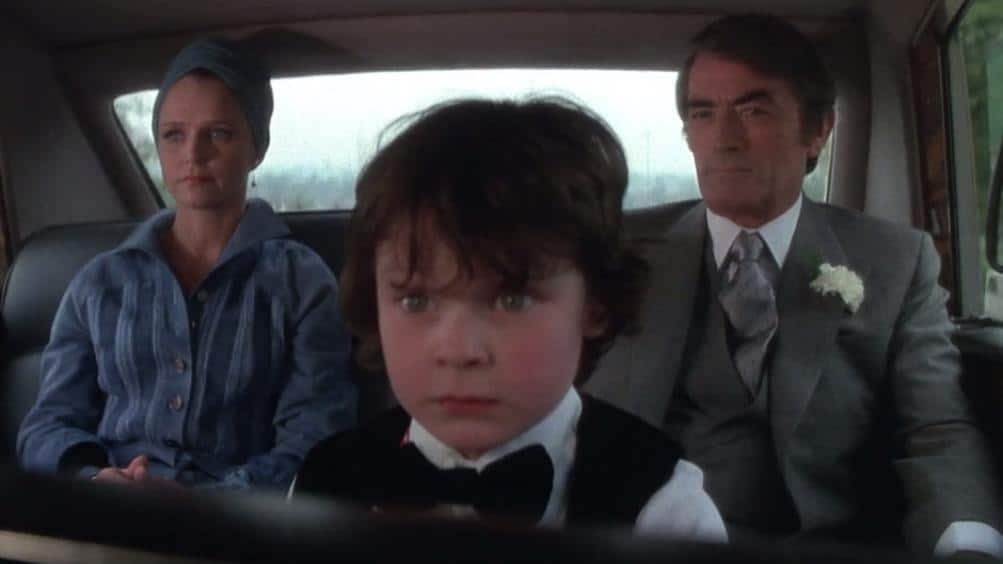
|
|